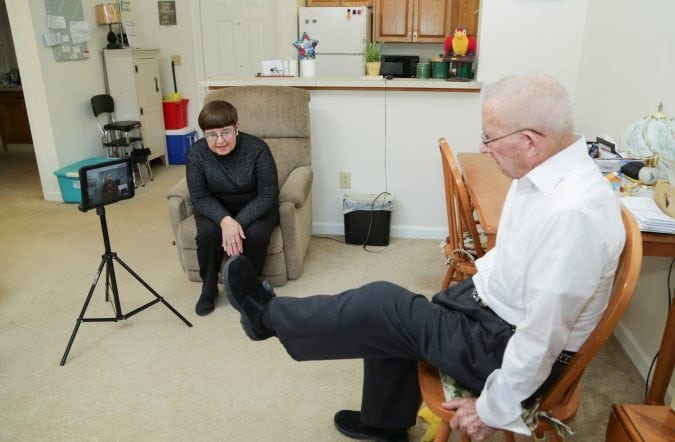Let’s remember 2016 as the year Hartford HealthCare established the Neuroscience Institute, Heart & Vascular Institute and the Bone & Joint Institute, opened the Headache Center and was recognized by Connecticut Magazine as a great place to work, but also for the way we distinguished ourselves and served our patients through innovation.
Here are some highlights — 16 innovations from ’16 – as chosen by Dr. Rocco Orlando III, Hartford HealthCare’s senior vice president and chief medical officer:
Awake Craniotomy: Dr. Brendan Kilroy performed an awake craniotomy on a pregnant patient, only the second case of its type reported worldwide. In this procedure, the patient remains awake so the surgeon can test highly sensitive, functionally critical regions of the brain before an incision or removal of a lesion. (Neuroscience Institute/Hartford Hospital)
Bloodless Heart And Kidney Transplant: Hartford Hospital became the first hospital in the United States to perform a heart and kidney transplant on a single patient without a blood transfusion. (Transplant Services/Hartford Hospital)
Bone & Joint Institute: Not to be outshone by its new cover-the-patient’s-backside gowns, the Bone & Joint Institute opened Jan. 9 as a $200 million showcase of the future of orthopedic care. New England’s first dedicated orthopedic hospital, spanning more than 200,000 square feet, also includes space for physical rehabilitation, a high-tech motion lab and a demonstration kitchen. (Bone & Joint Institute/Hartford Hospital)

Cancer: An Early Detection Blood Test: The Hartford HealthCare Cancer Institute is one of three initial participants in a clinical study that’s part of a San Francisco biotech company’s efforts to develop an early cancer screening that detects genetic changes in a blood test. Collaborators in the Circulating Cell-Free Genome Atlas study by Grail – a startup whose initial investors included Amazon.com founder Jeff Bezos and Microsoft founder Bill Gates and now plans to raise $1 billion in venture capital – also includes Mayo Clinic (Minnesota, Arizona and Florida) and the Guardian Research Network, a nationwide consortium of community health systems. (Hartford HealthCare Cancer Institute)
Cochlear Implants/Hearing Preservation: What does happiness sound like? Patients whose hearing improves dramatically after a surgeon at the Hearing and Balance Center implants an electrode array in their ear. Most people hear acoustically, but these activated implants help people pick up sound electronically. (Hearing & Balance Center/Hartford Hospital)
Deep Inferior Epigastric Perforator Flap: For breast-cancer patients contemplating a mastectomy, a new type of reconstructive surgery now available at Backus Hospital uses fat and skin from the abdominal area instead of implants filled with silicon or saline. Aside from avoiding an implant, the patient also benefits from the effects of what is essentially a tummy tuck. (Backus Hospital)
Mako For Total Knee Replacement: Mako, a precision technology designed for partial knee resurfacing and total hip replacements using a robotic arm, now has a third procedure on its can-do list. The first total knee replacement in the state using Mako was performed at Hartford Hospital. (Bone & Joint Institute/Hartford Hospital)
Nerve Transfer Surgery For Peripheral Nerve Injuries: Dr. Joel Bauman is the only neurosurgeon in Connecticut who performs complex micro-surgeries on injured nerves outside the spine. (Neuroscience Institute/Hartford Hospital)
MATCH: The opioid epidemic has changed the demographics, and treatment, of the nation’s drug problems. Medication-Assisted Treatment, Close To Home (MATCH) brought treatment to the suburbs, seven locations where patients can find medication reduces opiate cravings, relapse-prevention groups and other support services. Some MATCH locations are now offering treatment for 16- and 17-year-olds fighting addiction. (Rushford/Behavioral Health Network)
Neonatal Abstinence Syndrome: You and Your Baby: A baby born to a mother diagnosed with substance use disorder – which includes any drug or medication taken during pregnancy that is not prescribed, particularly opiates – can suffer the same of withdrawal symptoms as an adult. A new program at The Hospital of Central Connecticut guides mother and baby through withdrawal. A baby with Neonatal Abstinence Syndrome now remains in the hospital for at least five to seven days – and more if the baby requires additional medication. But the baby’s not alone: After the mother is discharged, a room is reserved for her and her baby on the Postpartum Unit.
Outpatient Total Shoulder Replacement: Nerve blocks that control pain for up to 72 hours allowed Dr. Chris Lena (orthopedic surgeon) and Dr. Eric Meisterling (anesthesiologist) to collaborate on the region’s first outpatient total shoulder replacement. No overnight stay in the hospital? “It was amazing,” says patient Roy Davidson. (Bone & Joint Institute/Hartford Hospital)
MARTTI Translator: Parlez-vous MARTTI? My Accessible Real-Time Trusted Interpreter, or MARTTI, is software used by the Windham Hospital paramedic program that provides video interpreter services for more than 55 spoken languages, American Sign Language and audio services for about 200 other languages. It’s the only hospital program in the state like it. With 13 towns in a culturally diverse rural setting that covers 360 square miles and a population with that includes Spanish, Mandarin, Polish and Russian languages, MARTTI gives Windham Hospital an MVP translator.
Primary Care/Behavioral Health Pilot Project: To reach people suffering from mental illness or addiction, the Behavioral Health Network and Integrated Care Partners started this pilot project that embeds behavioral health clinicians in five primary-care offices. Without leaving their doctor’s office, these patients can now receive consultations, short-term treatment and referrals to community and specialty services. The pilot project quickly produced a 167 percent increase in behavioral health appointments and a 35 percent reduction in emergency room use. The program has been expanded to seven additional sites, with a standardized curriculum and training for clinicians. (Behavioral Health Network)
TAVR: For patients too frail to undergo open-heart surgery, a minimally invasive procedure known as transcatheter aortic valve replacement, or TAVR, repairs the damaged valve instead of replacing it. Doctors usually access the heart through the groin or ribs, but that wasn’t an option for patient Carl Danielson and his surgeon, Dr. Robert Hagberg. Instead, Danielson became the first patient in Connecticut to have TAVR performed via the carotid artery. (Hartford HealthCare Heart & Vascular Institute at Hartford Hospital)
Telerehabilitation: All knee-replacement patients know it’s hard to restore knee mobility and strength without a strong rehabilitation program. But sometimes the hardest part is actually getting to the rehab assignment (and getting in and out of the car twice). A new program piloted by Jefferson House, the Hartford HealthCare Rehabilitation Network and the Bone & Joint Institute brings the first three weeks’ rehab sessions to the over-60 patient’s home, via an iPad and video connection with a physical therapist. (Hartford HealthCare Rehabilitation Network, Jefferson House, Bone & Joint Institute)

Zero Suicide: A national program that believes suicides of people under care within health and behavioral health systems are preventable found support in Connecticut with the work at the Institute of Living. It’s hoped that efforts to track patients as their care changes and encouraging greater staff awareness of potential warning signs can reduce, and ultimately eliminate, suicide. (Institute of Living/Behavioral Health Network)

